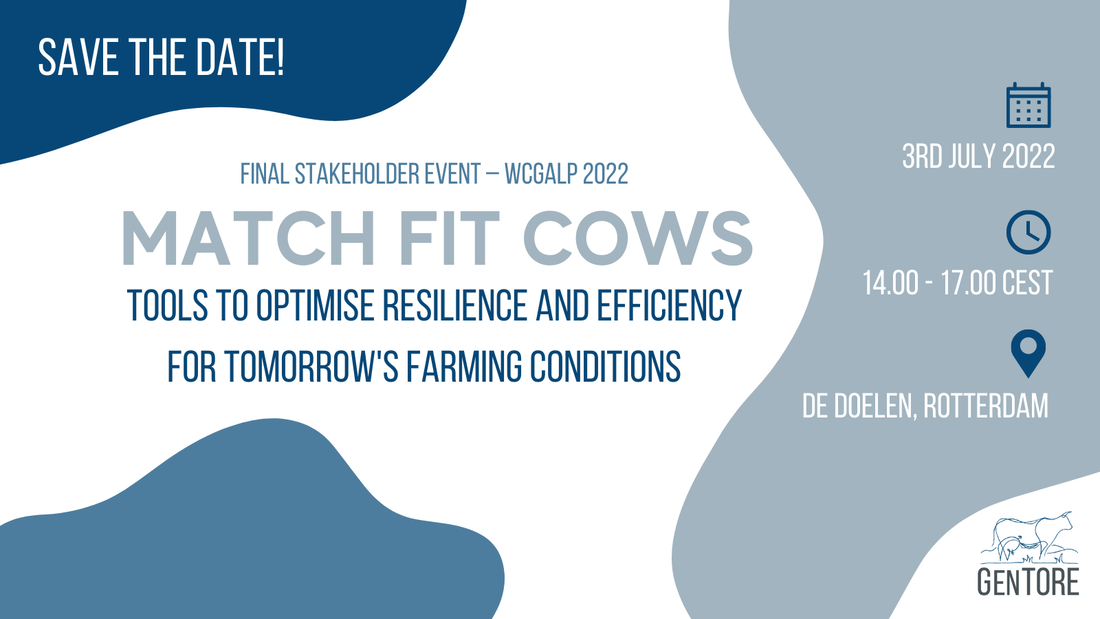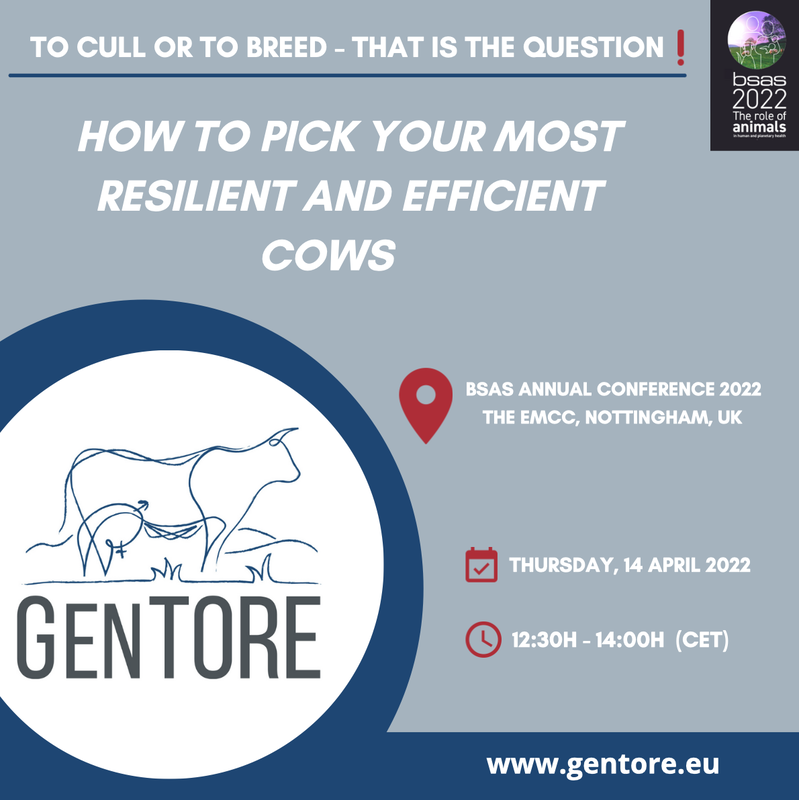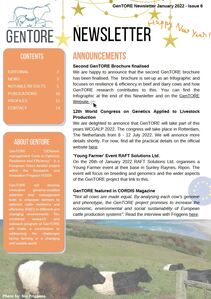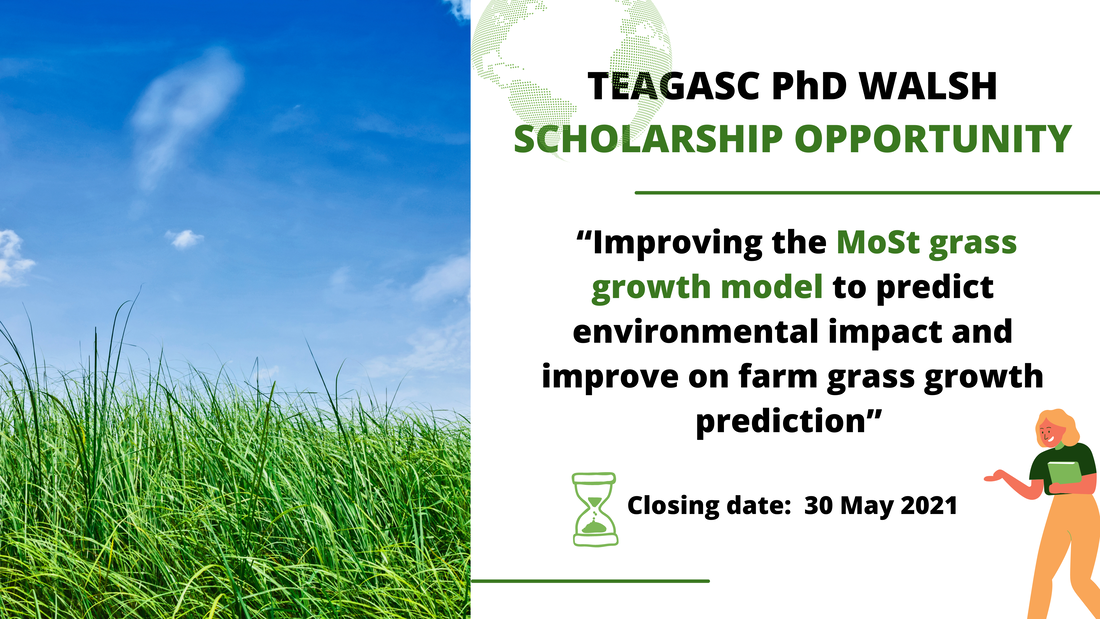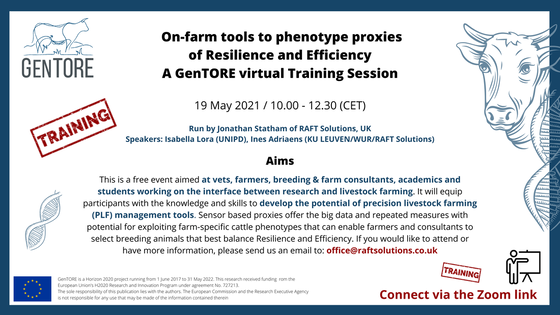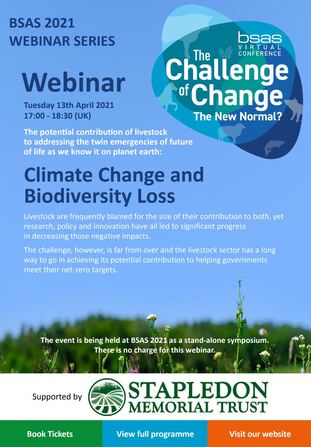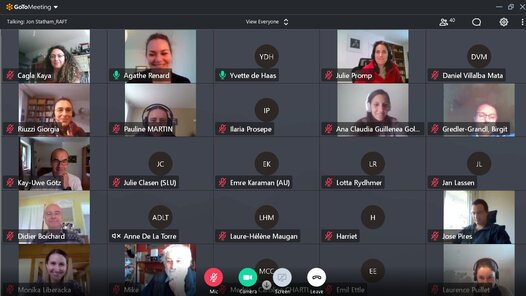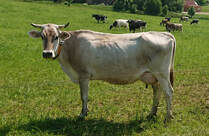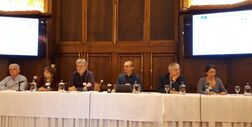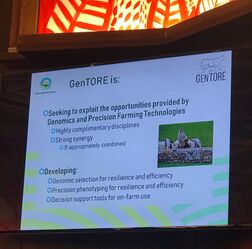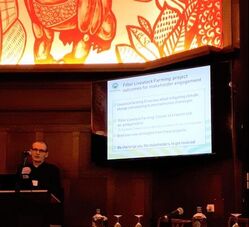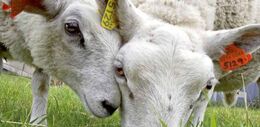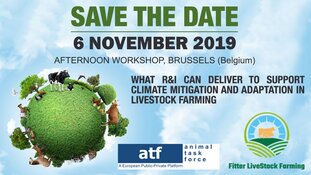News
GenTORE Final Stakeholder Event – Save the date!
|
GenTORE will be showcasing the results of 5-year research as a satellite event to WCGALP 2022 in De Doelen, Rotterdam, under the title "Match fit cows: Tools to optimise resilience and efficiency for tomorrow's farming conditions".
The event will take place on Sunday July 3rd from 14.00 to 17.00 and it will target mainly its stakeholders. The presentations will cover different aspects of GenTORE project's main outcomes, and they will lead to an eventual panel discussion. Fill in the registration form and see you in Rotterdam! |
GenTORE session at BSAS 2022
|
Between 12 and 14 of April, the BSAS Annual Conference – The role of animals in human and planetary health, will be hosted in hybrid form. On the 14th of April between 12:30-14:00, GenTORE will host a session at the BSAS conference titled “To cull or to breed – that is the question!”.
Speakers Jonathan Statham (RAFT Solutions), Harriet Bunning (SRUC), and Donagh Berry (Teagasc) will discuss the practical application of GenTORE’s project results in using on-farm data to measure and rank the resilience and efficiency of dairy and beef cows. For more information and registration visit: https://bsas.org.uk/conference |
GenTORE 6th Newsletter
|
GenTORE is taking shape
We are delighted to inform you that the latest newsletter is now available to read. In this issue, there is a series of interesting articles to explore, an overview of upcoming events, our latest video publications and of course, you can get to know some of the important personalities from behind the project. This issue contains interesting features such as:
Please enjoy this issue and don't hesitate to get in touch with us for ideas, announcements or good pictures for the next issue. |
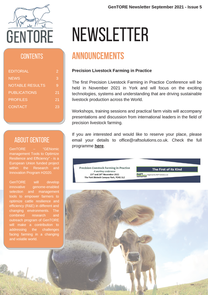
GenTORE 5th Newsletter
The third newsletter of GenTORE is now available on the website.
This issue contains interesting results from research performed for GenTORE such as:
Make sure to read our newsletter to be up to date on the most recent developments within GenTORE. You can subscribe to our newsletters here.
The third newsletter of GenTORE is now available on the website.
This issue contains interesting results from research performed for GenTORE such as:
- Preferences of European dairy stakeholders in breeding for resilient and efficient cattle: a Best-Worst Scaling approach
- What are the factors affecting the length of productive life in dairy cattle?
- How can cow-individual sensor data, national data and drone images improve our understanding of resilience
- Genomic mating plan accounting for genomic information
- Disentangling residual feed intake—Insights and approaches to make it more fit for purpose in the modern context
Make sure to read our newsletter to be up to date on the most recent developments within GenTORE. You can subscribe to our newsletters here.
|
GenTORE's animation video is released!
We are happy to announce that GenTORE released its animation movie explaining how farmers will be able to identify their best cows for breeding, with the right balance of efficiency and resilience. The animation is also available in French, German and Polish and provides subtitle options in Italian and Spanish! Watch the video here and check our YouTube channel for more videos! |
|
|
TEAGASC PhD WALSH SCHOLARSHIP OPPORTUNITY
This is an exciting opportunity for you if you have a degree in Agricultural Science, Plant Science, Agricultural Engineering, Computer Science or a similar discipline. The deadline for applications is 30 May 2021! Read all the details about the opportunity here. |
|
Free training session On-Farm tools to phenotype proxies of Resilience and Efficiency | 19 MAY 2021 | 10.00 - 12.30 (CET)
The training is aimed for vets, farmers, breeding & farm consultants, academics and students. If you would like to attend send us an email to: [email protected] and save this link to attend via Zoom on the 19th May. |
|
BSAS 2021 CONFERENCE | 12-15 APRIL 2021 | VIRTUAL
THE CHALLENGE OF CHANGE THE NEW NORMAL? Livestock are frequently blamed for the size of their contribution to both, yet research, policy and innovation have all led to significant progress in decreasing those negative impacts. The challenge, however, is far from over and the livestock sector has a long way to go in achieving its potential contribution to helping governments meet their net-zero targets. If you haven’t registered for the conference, you can do it here and read the full programme here. The virtual conference is hosted by: BSAS - British Society of Animal Science |
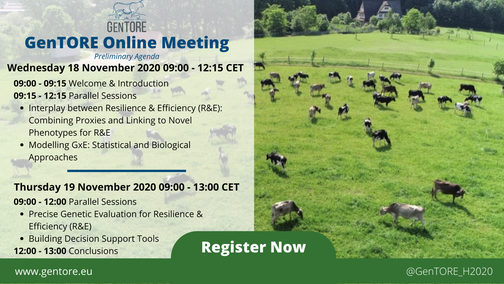
GenTORE Online Meeting
GenTORE is organising a midterm annual meeting on 18-19 November 2020, focusing on "Genotype to phenotype: Precision Breeding Tools for the Best Cows".
The preliminary meeting agenda includes "Modelling GxE (Genotype–environment interaction)", "Precise genetic evaluation for resilience and efficiency" and more. Registration to the meeting is available here.
GenTORE is organising a midterm annual meeting on 18-19 November 2020, focusing on "Genotype to phenotype: Precision Breeding Tools for the Best Cows".
The preliminary meeting agenda includes "Modelling GxE (Genotype–environment interaction)", "Precise genetic evaluation for resilience and efficiency" and more. Registration to the meeting is available here.

Post-doctoral position at INRAE
A new post-doc position on "Exploring associations between bovine feed efficiency and robustness" is available at UMR Herbivores, which is a joint research unit associating INRAE and the Higher Education and Research Institution VetAgro Sup.
The postdoctoral fellow will join the GenTORE project and, work within the WP 2.3 focused on experiments to test if resilience traits identified from productive and metabolic responses to short term nutritional challenges differ according to RFI scoring of animals in beef cows.
Deadline for application is 30 November 2020. For the application procedure and more details, please click here.
A new post-doc position on "Exploring associations between bovine feed efficiency and robustness" is available at UMR Herbivores, which is a joint research unit associating INRAE and the Higher Education and Research Institution VetAgro Sup.
The postdoctoral fellow will join the GenTORE project and, work within the WP 2.3 focused on experiments to test if resilience traits identified from productive and metabolic responses to short term nutritional challenges differ according to RFI scoring of animals in beef cows.
Deadline for application is 30 November 2020. For the application procedure and more details, please click here.
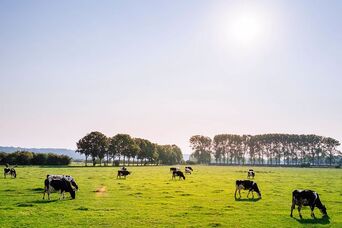
Herd Level Outputs - User Requirements Survey
GenTORE aims to develop innovative genome-enabled selection and management tools to empower farmers to optimize cattle resilience and efficiency in different and changing environments. One of the work packages (WP3) in GenTORE focuses on resilience and efficiency proxies from precision livestock measures in housed and extensive environments. The phenotyping tools for these proxies come from (a) close-to-market or market-ready on-farm sensor technology, (b) big data, and (c) novel sensor technologies. These tools will now be combined in a herd level monitoring system, with a focus on the resilience and efficiency of the herd.
Herd level monitoring offers opportunities for evidence-based management input to dairy and beef farms. Understanding patterns in herd performance can deliver a targeted approach that is of growing importance in larger herds and higher production animals. Sensor technologies are increasingly common in commercial farms and produce large quantities of data for review; this is not always in a format that can be used effectively. Combining individual level data from multiple sensor technologies in a form that is useable in real world situations in real time also requires an additional integration step to deal with the following issues:
Above all, the pattern of perturbations in time series sensor data from repeated measures such as daily milk yield, or activity, offers an approach to herd level decision making based on the resilience and efficiency of a particular herd. These decisions may involve breeding strategy development, but also culling strategies or the management protocols that address seasonal issues in e.g. transition health or mastitis.
We would be grateful if you could take a few minutes to answer the questions in this survey, which will help us in determining the contours of a herd level monitoring system for resilience and efficiency. The survey will close on 5th September 2020.
The survey can be found here: https://forms.gle/hhxpGQ68VT25NYv98
GenTORE aims to develop innovative genome-enabled selection and management tools to empower farmers to optimize cattle resilience and efficiency in different and changing environments. One of the work packages (WP3) in GenTORE focuses on resilience and efficiency proxies from precision livestock measures in housed and extensive environments. The phenotyping tools for these proxies come from (a) close-to-market or market-ready on-farm sensor technology, (b) big data, and (c) novel sensor technologies. These tools will now be combined in a herd level monitoring system, with a focus on the resilience and efficiency of the herd.
Herd level monitoring offers opportunities for evidence-based management input to dairy and beef farms. Understanding patterns in herd performance can deliver a targeted approach that is of growing importance in larger herds and higher production animals. Sensor technologies are increasingly common in commercial farms and produce large quantities of data for review; this is not always in a format that can be used effectively. Combining individual level data from multiple sensor technologies in a form that is useable in real world situations in real time also requires an additional integration step to deal with the following issues:
- Synchrony of indications at animal level. We can expect several of the technologies to produce proxies for the same thing, e.g. dips in activity and change in body temperature will both be proxies for changing infection/inflammation status. In combining them consideration needs to be given to which of them is the most relevant or reliable for use in an on-farm index?
- Also, the combination of algorithms needs to be able to accommodate the case where individual measures contradict each other, and the case where only one of the proxies is available (measurement errors and equipment failure will certainly happen in the real world).
Above all, the pattern of perturbations in time series sensor data from repeated measures such as daily milk yield, or activity, offers an approach to herd level decision making based on the resilience and efficiency of a particular herd. These decisions may involve breeding strategy development, but also culling strategies or the management protocols that address seasonal issues in e.g. transition health or mastitis.
We would be grateful if you could take a few minutes to answer the questions in this survey, which will help us in determining the contours of a herd level monitoring system for resilience and efficiency. The survey will close on 5th September 2020.
The survey can be found here: https://forms.gle/hhxpGQ68VT25NYv98
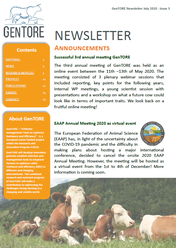
GenTORE 3rd Newsletter
The third newsletter of GenTORE is now available on the website.
This issue contains interesting results from research performed for GenTORE such as:
The third newsletter of GenTORE is now available on the website.
This issue contains interesting results from research performed for GenTORE such as:
- A new method to evaluate feed efficiency in dairy cattle that takes the dynamic of the process into account
- Farm adaptation to climate change impacts: a farmers' perception case study
- How do beef cows cope with short nutritional challenges during lactation?
- Resilience and productive lifespan can be predicted from at-market sensor data
- Variability in daily milk yield can help identify resilient herds
|
GenTORE's 3rd Annual Meeting
The third annual meeting of GenTORE was held as an online event between the 11th –13th of May 2020. The meeting consisted of 3 plenary webinar sessions that included reporting, key points for the following years, internal WP meetings, a young scientist session with presentations and a workshop on what a future cow could look like in terms of important traits. The recordings of the Young Scientists session are now available on our website and YouTube Channel! |

GenTORE policy brief
Farming cattle is becoming difficult given environmental challenges and an ever-increasing demand for food security. Enhancing animal welfare and mitigating against climate change, are growing challenges for livestock farmers. If they could identify the most efficient and resilient cows, they would potentially be able to keep less livestock, thus reducing the global environmental footprint.
GenTORE's policy brief describes the problem, provides its solutions and gives policy recommendations. Click here to read the policy brief.
Farming cattle is becoming difficult given environmental challenges and an ever-increasing demand for food security. Enhancing animal welfare and mitigating against climate change, are growing challenges for livestock farmers. If they could identify the most efficient and resilient cows, they would potentially be able to keep less livestock, thus reducing the global environmental footprint.
GenTORE's policy brief describes the problem, provides its solutions and gives policy recommendations. Click here to read the policy brief.
|
New Practice Abstracts
GenTORE partners have published 4 practice abstracts that are listed below. Click the links to enjoy the read. More will follow!
|
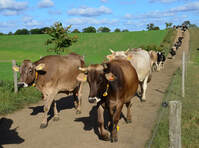 Photo: FSK
Photo: FSK
GenTORE Fact Sheet
What is precision animal breeding? What are GenTORE's solutions to identify the most efficient and resilient cattle? GenTORE answers these questions and more in its fact sheet, which is available in English, French, Italian, Spanish and German!
What is precision animal breeding? What are GenTORE's solutions to identify the most efficient and resilient cattle? GenTORE answers these questions and more in its fact sheet, which is available in English, French, Italian, Spanish and German!

New PhD position on developing biomarkers of resilience at INRAE
At INRAE, there is a new PhD position available on "Combining genetic and modelling approaches to develop new non-invasive biomarkers of resilience based on milk metabolites".
The objectives of the PhD are to:
i) develop an index of animal resilience based on measures of metabolites in milk, coupled with data on the immune responsiveness,
ii) quantify the influence of the genetic background of these animals on the resilience responses.
This PhD study will make a strong contribution to developing non-invasive markers of resilience that can be used a selection proxy and also on the methodology for integrating multivariate time-series data.
Applications will be accepted until 15th May 2020 but the position may be filled prior to this date if a suitable candidate presents. For the requirements and the application procedure, please click here.
At INRAE, there is a new PhD position available on "Combining genetic and modelling approaches to develop new non-invasive biomarkers of resilience based on milk metabolites".
The objectives of the PhD are to:
i) develop an index of animal resilience based on measures of metabolites in milk, coupled with data on the immune responsiveness,
ii) quantify the influence of the genetic background of these animals on the resilience responses.
This PhD study will make a strong contribution to developing non-invasive markers of resilience that can be used a selection proxy and also on the methodology for integrating multivariate time-series data.
Applications will be accepted until 15th May 2020 but the position may be filled prior to this date if a suitable candidate presents. For the requirements and the application procedure, please click here.
|
GenTORE at Animal Task Force and Fitter Livestock Farming Workshop
GenTORE participated in the Fitter Livestock Farming Workshop about “What R&I can deliver to support climate mitigation and adaptation in livestock farming?” on 6 November 2019 in Brussels, Belgium. The workshop was jointly organized by Animal Task Force (ATF) and Common Dissemination Booster (CDB) Fitter Livestock Farming, that is lead by GenTORE. The workshop was started by ATF President Jean-Louis Peyraud and the coordinator of GenTORE Nic Friggens. Jean-Charles Cavitte from the European Commission - DG AGRI gave a short introduction by highlighting the importance of research programmes for European policy makers to identify progresses and gaps in knowledge for future policies. The introduction of the programme for Fitter Livestock Farming Cluster projects were provided by Nic Friggens. He mentioned that livestock farming is serious about mitigating climate change and adapting to environmental challanges. Friggens gave brief information about the aim of the GenTORE project and he pointed out that there is a need of incentives to spread use of genomics, to facilitate incorporation of data from on farm technologies, to encourage practical use of decision support tools for reducing farm environmental footprint. Other Fitter Livestock Farming Cluster projects (Feed-A-Gene, GplusE, IMAGE, SAPHIR & SmartCow) were presented briefly by the project representatives, providing the aim of the project, outcomes and the lessons learned. This was followed by the discussion session with the project coordinators and the audience, lead by ATF Vice-president Vivi H. Nielsen. The representatives of other H2020 projects (METHAGENE, Smarter, ROADMAP, HealthyLivestock, Bovine) contributed to the session by providing brief information about the projects. The presentations of the workshop are available here. |
|
GenTORE was presented at the NOVA course Biological Consequences of Selection
August 2019 The GenTORE project participated in the NOVA course 'Biological Consequences of Selection' (NOVA-410/320) that was held between 19-23 August at the Hafjell Hotel in Norway. The course was organized by the Norwegian University of Life Sciences (NMBU), for 15 PhD and MSc students from universities/institutions of six different European countries. During the course topics like genetic variation of behavioral traits, genotyp x environment interactions, robustness, trade-offs and adaptive capacity and modelling and the genetics of feed efficiency were discussed. |
|
Animal Task Force (ATF) and Fitter Livestock Farming Workshop
On November 06, 2019, Animal Task Force (ATF) and Fitter Livestock Farming Common Dissemination Booster (CDB) jointly organises an afternoon session on “What R&I can deliver to support climate mitigation and adaptation in livestock farming”. The event will take place in Brussels. This workshop will bring together animal scientists with livestock professionals and advisors, as well as researchers, non-profit & societal organisations and industry representatives, to discuss sustainable use of resources, preservation of biodiversity, livestock gene bank collections and improvement of soil quality in the livestock sector. You can watch the video explaining Fitter Livestock Farming and providing information about this event. For more information, programme and registration, please check ATF's website. Read more about the Fitter Livestock Farming here. |
Towards a Sustainable European Livestock Farming
Fitter Livestock Farming Project Group organises two workshops, providing a discussion forum for their collaborative Policy Paper
Two workshops focused on sustainable and competitive livestock production in Europe should be brought to your attention. The first one, on 28th August 2019, is part of the programme of the European Federation for Animal Science (EAAP) Annual Meeting in Ghent (Belgium), at the International Convention Centre. The second one, entitled “What R&I can deliver to support climate mitigation and adaptation in livestock farming” is organised together with the Animal Task Force (ATF) and takes place on 6th November, in Brussels (Belgium).
Both workshops will bring together animal scientists with livestock professionals and advisors, as well as researchers, non-profit & societal organizations and industry representatives, to discuss sustainable use of resources, preservation of biodiversity, livestock gene bank collections and improvement of soil quality in the livestock sector.
The Fitter Livestock Farming Project Group (PG) is a cluster of six research projects (FEED-A-GENE, GenTORE, GplusE, IMAGE, SAPHIR & SmartCow) funded by the European Commission and coordinated under the Common Dissemination Booster (CDB), aiming to bring Innovation to food safety and sustainable agriculture.
Towards environmentally friendly livestock farming. The livestock sector contributes substantially to the European economy and to the vitality of many European countries. The livestock sector also has great potential to contribute to mitigating climate impact. In the EU, whilst livestock are currently responsible for 7% of total emissions, there is a view that using grass to feed ruminants like cattle and sheep offers huge mitigation potential as grass is a large reservoir able to hold excess CO2. New technologies and relevant incentives like being able to select the most efficient animals will enable the livestock sector to use best practices to enable it to come close to CO2 neutrality as well as reducing methane and NO2 emissions. If these measures are taken up alongside reducing deforestation and better use of soils for agricultural production the livestock sector in Europe will be starting to significantly contribute to mitigation of climate impacts.
Another relevant topic is the gene banks. The animal gene banks are an investment for countries and research institutions as well as an asset for the livestock sector. A better knowledge of these collections is key to stimulate to their use. However, information about gene bank collections is often hard to find for a breeder, because these gene bank collections are scarce.
The Fitter Livestock Farming PG focuses on these topics and is working on solutions and proposals to turn the EU sustainable livestock farming into reality.
Mitigation actions for a Sustainable Fitter Livestock Farming
The Fitter Livestock Farming PG is organising a half-day Special Session at EAAP, entitled “Burning issues in biodiversity 2: fitter livestock farms from better gene banks?”, on 28th August 2019, in Ghent, to foster the refined characterization of gene bank samples for the livestock sector. The session takes place from 14:00-17:00 in the Baeckeland 1 room of the International Convention Centre (ICC).
The session brings together various stakeholders from different backgrounds focused on increasing sustainability levels of livestock farming, mainly through animal gene banks. Five projects that are part of Fitter Livestock Farming PG will present their results and approaches that to better document gene bank collections:
Towards a competitive livestock production – how to prepare the future?
On 6th November, the afternoon session “What R&I can deliver to support climate mitigation and adaptation in livestock farming”, organised by the ATF and the Fitter Livestock Farming PG will take place, in Brussels. The session will present products, tools, devices and systems, developed by the EU-funded projects from the Fitter Livestock Farming PG, that are tackling challenges in animal production through innovation to improve food security and livestock farming sustainability. More information will be available soon.
A Policy Paper on Sustainable European livestock farming systems
The above mentioned workshops will provide inputs for a Policy Paper to be defined by the Fitter Livestock Farming PG. The paper, to be provided by end of the year, will propose priorities for research and innovation for Horizon Europe funding programme, from the European Commission.
WANT TO JOIN US AT BOTH SESSIONS & CONTRIBUTE TO THE FITTER LIVESTOCK FARMING POLICY PAPER?
STAY UPDATED, SUBSCRIBE THE MAILING LIST. Read more here.
Fitter Livestock Farming Project Group organises two workshops, providing a discussion forum for their collaborative Policy Paper
Two workshops focused on sustainable and competitive livestock production in Europe should be brought to your attention. The first one, on 28th August 2019, is part of the programme of the European Federation for Animal Science (EAAP) Annual Meeting in Ghent (Belgium), at the International Convention Centre. The second one, entitled “What R&I can deliver to support climate mitigation and adaptation in livestock farming” is organised together with the Animal Task Force (ATF) and takes place on 6th November, in Brussels (Belgium).
Both workshops will bring together animal scientists with livestock professionals and advisors, as well as researchers, non-profit & societal organizations and industry representatives, to discuss sustainable use of resources, preservation of biodiversity, livestock gene bank collections and improvement of soil quality in the livestock sector.
The Fitter Livestock Farming Project Group (PG) is a cluster of six research projects (FEED-A-GENE, GenTORE, GplusE, IMAGE, SAPHIR & SmartCow) funded by the European Commission and coordinated under the Common Dissemination Booster (CDB), aiming to bring Innovation to food safety and sustainable agriculture.
Towards environmentally friendly livestock farming. The livestock sector contributes substantially to the European economy and to the vitality of many European countries. The livestock sector also has great potential to contribute to mitigating climate impact. In the EU, whilst livestock are currently responsible for 7% of total emissions, there is a view that using grass to feed ruminants like cattle and sheep offers huge mitigation potential as grass is a large reservoir able to hold excess CO2. New technologies and relevant incentives like being able to select the most efficient animals will enable the livestock sector to use best practices to enable it to come close to CO2 neutrality as well as reducing methane and NO2 emissions. If these measures are taken up alongside reducing deforestation and better use of soils for agricultural production the livestock sector in Europe will be starting to significantly contribute to mitigation of climate impacts.
Another relevant topic is the gene banks. The animal gene banks are an investment for countries and research institutions as well as an asset for the livestock sector. A better knowledge of these collections is key to stimulate to their use. However, information about gene bank collections is often hard to find for a breeder, because these gene bank collections are scarce.
The Fitter Livestock Farming PG focuses on these topics and is working on solutions and proposals to turn the EU sustainable livestock farming into reality.
Mitigation actions for a Sustainable Fitter Livestock Farming
The Fitter Livestock Farming PG is organising a half-day Special Session at EAAP, entitled “Burning issues in biodiversity 2: fitter livestock farms from better gene banks?”, on 28th August 2019, in Ghent, to foster the refined characterization of gene bank samples for the livestock sector. The session takes place from 14:00-17:00 in the Baeckeland 1 room of the International Convention Centre (ICC).
The session brings together various stakeholders from different backgrounds focused on increasing sustainability levels of livestock farming, mainly through animal gene banks. Five projects that are part of Fitter Livestock Farming PG will present their results and approaches that to better document gene bank collections:
- FEED-A-GENE is identifying criteria and populations related to a better feed efficiency in pigs and chickens fed alternative feedstuffs.
- GenTORE will illustrate impacts of geoclimatic classes and farm type (organic or conventional) on economic resilience of dairy farms.
- GplusE developed mid-infrared milk analysis based technologies that could be used in different ways to add value to gene banks.
- IMAGE is using time series of gene bank collections to identify selection signatures in cattle breed. It is also producing molecular data with the aim to correlate them with adaptation or specific phenotypic traits of breeds being present in gene banks.
- The SmartCow is devoted to phenotyping: animals with original phenotypes would be a target for gene bank collection, and resources from gene banks could be used to produce animals from past genotypes to be compared with current ones.
Towards a competitive livestock production – how to prepare the future?
On 6th November, the afternoon session “What R&I can deliver to support climate mitigation and adaptation in livestock farming”, organised by the ATF and the Fitter Livestock Farming PG will take place, in Brussels. The session will present products, tools, devices and systems, developed by the EU-funded projects from the Fitter Livestock Farming PG, that are tackling challenges in animal production through innovation to improve food security and livestock farming sustainability. More information will be available soon.
A Policy Paper on Sustainable European livestock farming systems
The above mentioned workshops will provide inputs for a Policy Paper to be defined by the Fitter Livestock Farming PG. The paper, to be provided by end of the year, will propose priorities for research and innovation for Horizon Europe funding programme, from the European Commission.
WANT TO JOIN US AT BOTH SESSIONS & CONTRIBUTE TO THE FITTER LIVESTOCK FARMING POLICY PAPER?
STAY UPDATED, SUBSCRIBE THE MAILING LIST. Read more here.
Resilience and Robustness Explained
Our internal GenTORE document on defining resilience will be turned into a published paper soon. This document that builds on stakeholder consultation and exchange among scientists provides us with a way to move towards operational measures of resilience that can be deployed on commercial farms. The resilience paper is planned to be out by the end of the year. The updates can be followed on our website and social media accounts. It will complement the recent review published by GenTORE members on robustness, a synthesis to facilitate its use in livestock breeding and management, which is freely available here.
Our internal GenTORE document on defining resilience will be turned into a published paper soon. This document that builds on stakeholder consultation and exchange among scientists provides us with a way to move towards operational measures of resilience that can be deployed on commercial farms. The resilience paper is planned to be out by the end of the year. The updates can be followed on our website and social media accounts. It will complement the recent review published by GenTORE members on robustness, a synthesis to facilitate its use in livestock breeding and management, which is freely available here.

